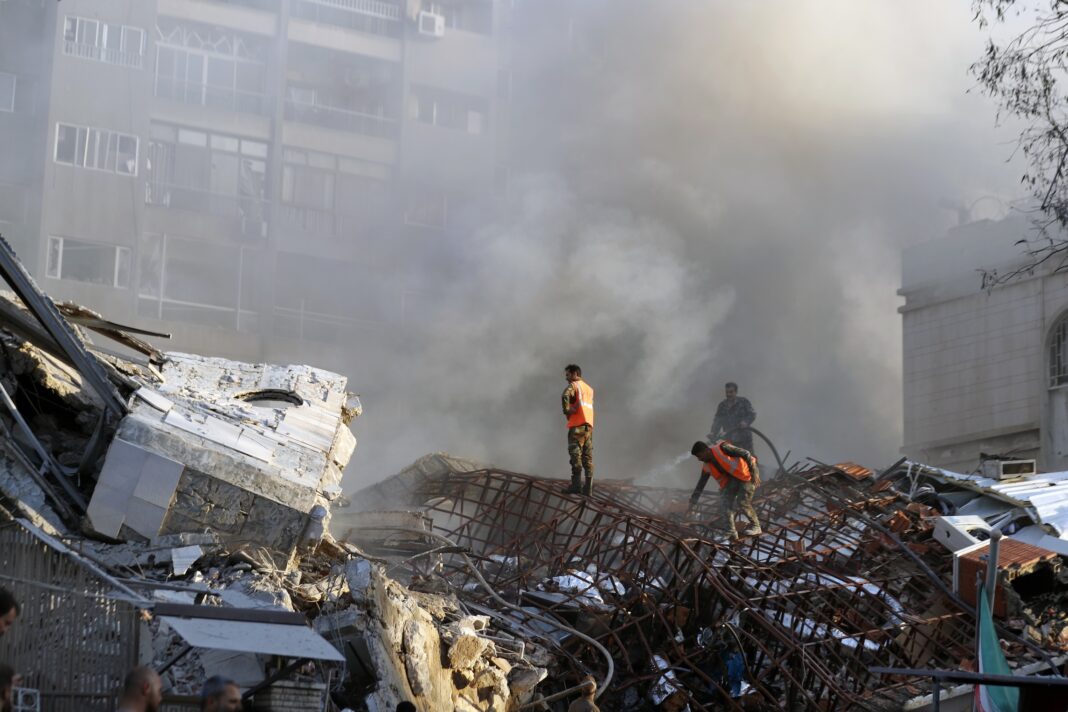By Joel Gehrke. Media: Washingtonexaminer
Iran warned United Nations Security Council envoys to expect retaliation against Israel’s apparent bombardment of a diplomatic facility in Syria that killed several Iranian military commanders.
“The Islamic Republic of Iran has exercised considerable restraint, but it is imperative to acknowledge that there are limits to such forbearance,” Iranian envoy Zahra Ershadi, the regime’s deputy representative to the United Nations, said Tuesday afternoon. “The occupying regime must bear full responsibility for its consequences. Iran reserves its legitimate and inherent right under international law and the United Nations Charter to take a decisive response to such reprehensible acts.”
The high-profile bombardment of an annex to Iran’s embassy in Damascus could prove to be the flashpoint that turns a sprawling proxy war between Israel and Iran into a larger confrontation, U.N. and Western officials fear. Yet the international response to the strike put a spotlight on the fault lines that divide the major nuclear-armed states, as Western allies struggled to balance their discomfort over the targeting of an apparent diplomatic facility with their recognition of Iran’s support for terrorism, while Russia and China offered full-throated support for Tehran.
“Do not call others to de-escalation and pin the labels of aggressors on the victims of the attack,” Russian Ambassador Vasily Nebenzia said Tuesday in a rebuke directed at U.S. and British officials. “In this context, any potential escalation in the situation will be fully on your conscience.”

That negative review of the Western statements punctuated Nebenzia’s second intervention at the council meeting after he launched the discussion with an extensive condemnation of Israel and warned Western states that their failure to follow suit could have dangerous effects.
“If we do not reaffirm this position of solidarity, next time, the diplomatic mission of any state could be targeted by an air raid,” he said. “We trust that each of you today will give a fair assessment to Israel’s actions against the Iranian diplomatic mission.”
United Nations Secretary-General Antonio Guterres offered his own condemnation of the strike — “the principle of the inviolability of diplomatic and consular premises and personnel must be respected in all cases in accordance with international law,” he said — in a statement earlier Tuesday issued through his spokesman. And he spoke with Iranian Foreign Minister Hossein Amir-Abdollahian earlier Tuesday.
“We are very concerned about a potential major escalation, beyond the escalations that we’re already seeing,” Stéphane Dujarric, Guterres’ spokesman, told reporters in New York earlier Tuesday.
The strike on Tuesday killed seven Islamic Revolutionary Guards Corps officers, according to Iranian officials, including one general whom the U.S. Treasury Department identified as far back as 2010 as playing a key role in “guaranteeing weapons shipments to Hezbollah,” Iran’s terrorist proxy force in Lebanon. Israel has targeted Iranian assets in Syria for several years, but the potential for a larger conflict has soared in the months since the October 7 attack by Hamas ignited a war in Gaza.
Those cross-cutting factors put Secretary of State Antony Blinken’s team in an uncomfortable position, torn between the impropriety of bombing a diplomatic facility and their general perception of Iran and its terrorist proxies as driving causes of hostility in the region.
“Terrorists and other armed groups, some backed by the Syrian regime and Iran, have used Syrian territory to plot and launch attacks on Israel and U.S. facilities and personnel,” Robert Wood, the deputy U.S. representative to the United Nations, said Tuesday. “Even as we continue to learn more about this incident, it seems clear that every member of this council should reiterate that all states — including Iran and Syria — have a responsibility to avoid the path of escalation, to stop arming and advising terrorist groups, and to rein in the actions of proxies who threaten regional peace and security.”
Yet the general discussion of the brewing crisis was shaped by the overarching tensions between the United States and its allies, on the one hand, and Russia and China on the other. That dynamic was evident from the outset when Nebenzia began his remarks by objecting to a U.N. official’s uttering of the phrase “rules-based international order,” even though the official used the term to condemn the strike on the Iranian facility.
“We believe it is strange that a representative of the secretariat is using terms such as a rules-based international order, which our Western partners love to use so much,” Nebenzia said.
His Chinese counterpart invoked the memory of “a U.S.-led NATO airstrike” on China’s embassy in Belgrade, Yugoslavia, while “express[ing] our deepest sympathy” with Iran.
“This attack is of an extremely vicious nature,” said China’s deputy representative at the U.N., Geng Shuang. “To allow impunity for such reckless acts . . . would send a seriously wrong signal and would encourage even more risky acts.”
Nebenzia, who has spent years trying to rebut Western criticism of Russia’s invasion of Ukraine, reveled in the opportunity to arraign the U.S. for its backing of Israel.
“What if it was your embassy that were attacked or your consulate in the region? Would you respond in the same way?” the Russian envoy said. “This is your rules-based order in all its glory.”




























































































Discussion about this post